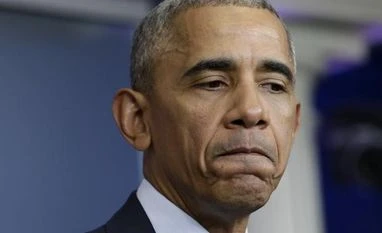The administration also penalised four top officers of one of those services, the powerful military intelligence unit known as the GRU Intelligence agencies have concluded that the GRU ordered the attacks on the Democratic National Committee and other political organisations, with the approval of the Kremlin, and ultimately enabled the publication of the emails it harvested.
The expulsion of the 35 Russians, whom the administration said were spies posing as diplomats and other officials, and their families was in response to the harassment of American diplomats in Russia, State Department officials said. It was unclear if they were involved in the hacking.
In addition, the State Department announced the closing of two waterfront estates — one in Glen Cove, New York, and another on Maryland’s Eastern Shore — that it said were used for Russian intelligence activities, although officials declined to say whether they were specifically used in the election-related hacks.
Taken together, the sweeping actions announced by the White House, the Treasury, the State Department and intelligence agencies on Thursday amount to the strongest American response yet to a state-sponsored cyberattack. They also appeared intended to box in President-elect Donald J Trump, who will now have to decide whether to lift the sanctions on Russian intelligence agencies when he takes office next month.
Trump responded to the Russian sanctions late Thursday by reiterating a call to “move on.” But he pledged to meet with intelligence officials, who have concluded that the Russian hacking was an attempt to tip the election to Trump.
In an earlier statement from Hawaii, Obama took a subtle dig at Trump, who has consistently cast doubt on the intelligence showing that the Russian government was deeply involved in the hacking.
“All Americans should be alarmed by Russia’s actions,” Obama said, and added that the United States acted after “repeated private and public warnings that we have issued to the Russian government, and are a necessary and appropriate response to efforts to harm US interests in violation of established international norms of behaviour.”
He issued a new executive order that allows him, and his successors, to retaliate for efforts to influence elections in the United States or those of “allies and partners,” a clear reference to concern that Russia’s next target may be Germany and France. Already there are reports of influence operations in both.
Trump’s position is at odds with most members of his party, who after classified briefings have called for investigations into the combination of cyberattacks and old-style information warfare used in the 2016 campaign. Trump has largely stuck to the theory he set forth in a debate with Hillary Clinton in September, when he said the hacks could have been organised by “somebody sitting on their bed that weighs 400 pounds.”
Russia criticised the sanctions and vowed retaliation.
“Such steps of the US administration that has three weeks left to work are aimed at two things: to further harm Russian-American ties, which are at a low point as it is, as well as, obviously, deal a blow on the foreign policy plans of the incoming administration of the president-elect,” Dmitri S Peskov, the spokesman for President Vladimir V Putin, told reporters.
Konstantin Kosachyov, the head of the foreign affairs committee in the upper house of the Russian Parliament, told Interfax that “this is the agony not even of ‘lame ducks,’ but of ‘political corpses.’”
Despite the international fallout and political repercussions surrounding the announcement, it is not clear how much effect the sanctions will have, except on the ousted diplomats, who have until Sunday to leave the country. GRU officials rarely travel to the United States, or keep assets here.
The four Russian intelligence officials are Igor Valentinovich Korobov, the chief of the GRU, and three deputies: Sergey Aleksandrovich Gizunov, Igor Olegovich Kostyukov and Vladimir Stepanovich Alexseyev.
The administration also put sanctions on three companies and organisations that it said supported the hacking operations: the Special Technology Center, a signals intelligence operation in Saint Petersburg, Russia; a firm called Zorsecurity that is also known as Esage Lab; and the Autonomous Noncommercial Organisation Professional Association of Designers of Data Processing Systems, whose lengthy name, American officials said, was cover for a group that provided special training for the hacking.
You’ve reached your limit of {{free_limit}} free articles this month.
Subscribe now for unlimited access.
Already subscribed? Log in
Subscribe to read the full story →

Smart Quarterly
₹900
3 Months
₹300/Month
Smart Essential
₹2,700
1 Year
₹225/Month
Super Saver
₹3,900
2 Years
₹162/Month
Renews automatically, cancel anytime
Here’s what’s included in our digital subscription plans
Access to Exclusive Premium Stories
Over 30 subscriber-only stories daily, handpicked by our editors


Complimentary Access to The New York Times
News, Games, Cooking, Audio, Wirecutter & The Athletic
Business Standard Epaper
Digital replica of our daily newspaper — with options to read, save, and share


Curated Newsletters
Insights on markets, finance, politics, tech, and more delivered to your inbox
Market Analysis & Investment Insights
In-depth market analysis & insights with access to The Smart Investor


Archives
Repository of articles and publications dating back to 1997
Ad-free Reading
Uninterrupted reading experience with no advertisements


Seamless Access Across All Devices
Access Business Standard across devices — mobile, tablet, or PC, via web or app



)
